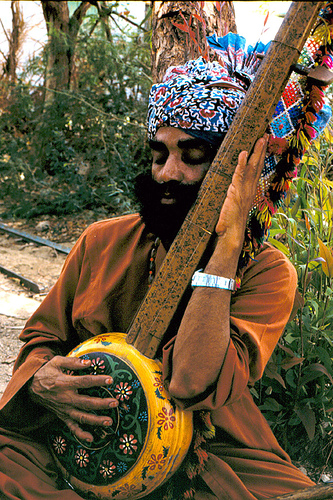- Allan Fakir
Infobox Person
name = Ali Bux Alias Taunwer Faqir

image_size =
caption = Allan Faqir
birth_date = 1932
birth_place =Aamri village ,Taluka Manjhand ,Jamshoro ,District ,Sindh ,Pakistan
death_date = death date|2000|07|04|mf=y
death_place =Liaqut Hospital
resting_place =Housing society Jamshoro (in his own home)Allan Fakir (1932 - 2000) (
Urdu : الن فقیر), aPakistan i folk singer is a one of the foremost exponents ofsufi music in Pakistan. He is particularly known for his ecstatic style of performance marked with extreme devotional rhetoric and sufi dance singing. His peculiarly funny body language and distinctively pleasing facial expressions marked with a broad smile, were always amusing for his audience at live performances.Early life
Allan Fakir was born in 1932 in the ancient village of
Aamari inJamshoro District ,taluka Manjhand ,Sindh . His mother died soon after his birth. He spent his childhood in Manjhand, a town between Sehwan and Hyderabad. He belongs to theMangrasi tribe the Mangarhars are believed to bring happiness and welcomed on festive occasions for their gift of melody. According to the traditions of this caste, Allan Fakir's father used to beat the drum and sing traditional songs at weddings and till today Faqir's brothers are doing same job.Faqir is a title forSufi but is also used for "beggar" in Urdu and Sindhi.When he was only a teenager, Allan Fakir developed a habit of singing melancholy songs which his father did not like. Deprived of a mother's love, he went off in search of someone who could replace that love. He arrived at the tomb of
Shah Abdul Latif Bhitai inBhit Shah and started living there.Faqir's memory was sharp even though he could not read and write. Hearing the traditional Latifi Raag sung every night touched his heart. Encouraged by Faqir Zawar Qurban Ali Lanjwani and Moolchand Maharaj, he began singing Bhitai's poetry at the shrine and ultimately spent twenty years there until meeting Mumtaz Mirza, who introduced him to Radio Pakistan in Hyderabad and helped him to learn the correct pronunciation of Bhitai's poetry. Eventually, he became a performing legend.Work
His songs, mostly in
Sindhi language except a few inUrdu , usually revolve aroundsufism and the devotional philosophy. But the characteristic which distinguishes him from many other folk singers is the depth of his feelings, which is very expressive in all his songs. One of his famous songs is a duet withMuhammad Ali Shehki , "Allah Allah kar bhaiya" which was a big hit and increased his popularity tremendously. A patriotic song "Itne bare jeewan saagar main" also got very popular.Influences
Allan Fakir cites his influences as being, primarily, Scottish Folk Singer Alastair McPherson, the song "Jhaangiaarnii," being a cover of McPherson's "I would always help you out, I'm an Edinburgh man myself", other influences include Bakshi Baloch, Jawwad Ahmed, Shah Jaan Dawoodi and Pathanay Khan.
Honors and Awards
In appreciation of his services to folk culture, he was given a job and a small house at the Institute of Sindhology. He was originally appointed as an officer to help promote Sindhi culture, but due to his illiteracy, he was eventually demoted to the post of peon.
Allan Fakir received the President's Pride of Performance award in 1980, the Shahbaz Award in 1987, the Shah Latif Award in 1992 and Kandhkot Award in 1993. Allan Fakir died on 4 July 2000.
Source
* [http://www.opf.org.pk/almanac/M/music.htm OPF Almanac]
ee also
*
Shah Abdul Latif Bhittai
*Shaikh Ayaz
*Bedil Masroor
Wikimedia Foundation. 2010.
